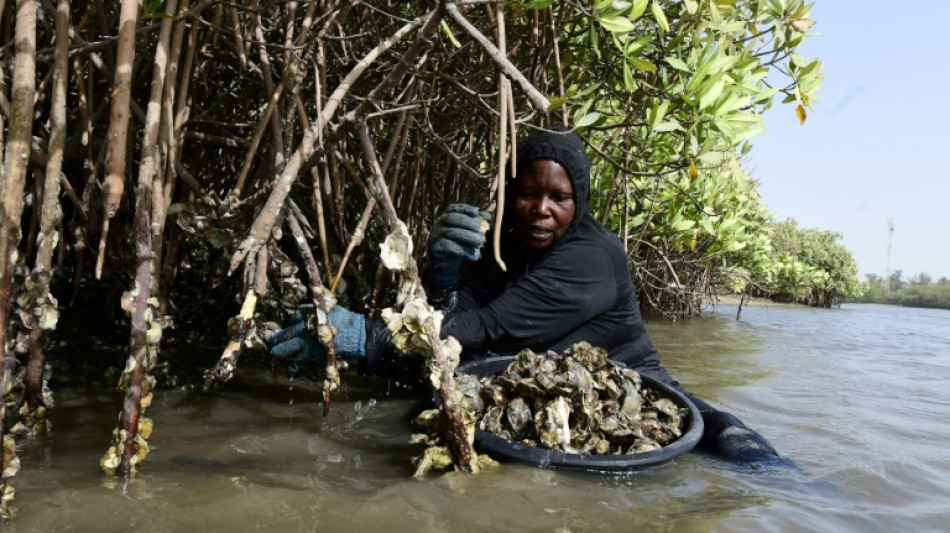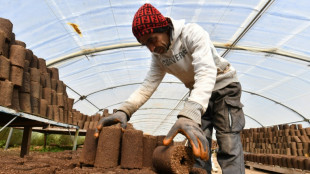
-
 Japan leads hefty global stock market losses on tariff woes
Japan leads hefty global stock market losses on tariff woes
-
Saka 'ready to go' after long injury lay-off: Arteta

-
 Ingebrigtsen Sr, on trial for abusing Olympic champion, says he was 'overly protective'
Ingebrigtsen Sr, on trial for abusing Olympic champion, says he was 'overly protective'
-
Tourists and locals enjoy 'ephemeral' Tokyo cherry blossoms

-
 Khamenei warns of 'strong' response if Iran attacked
Khamenei warns of 'strong' response if Iran attacked
-
France fines Apple 150 million euros over privacy feature

-
 UK PM urges nations to smash migrant smuggling gangs 'once and for all'
UK PM urges nations to smash migrant smuggling gangs 'once and for all'
-
Thai authorities probe collapse at quake-hit construction site

-
 France's Le Pen convicted in fake jobs trial
France's Le Pen convicted in fake jobs trial
-
Chinese tech giant Huawei says profits fell 28% last year

-
 Trump says confident of TikTok deal before deadline
Trump says confident of TikTok deal before deadline
-
Myanmar declares week of mourning as hopes fade for quake survivors

-
 Japan's Nikkei leads hefty market losses, gold hits record
Japan's Nikkei leads hefty market losses, gold hits record
-
Tears in Taiwan for relatives hit by Myanmar quake

-
 Venezuela says US revoked transnational oil, gas company licenses
Venezuela says US revoked transnational oil, gas company licenses
-
'Devastated': Relatives await news from Bangkok building collapse

-
 Arsenal, Tottenham to play pre-season North London derby in Hong Kong
Arsenal, Tottenham to play pre-season North London derby in Hong Kong
-
Japan's Nikkei leads hefty equity market losses; gold hits record

-
 Israel's Netanyahu picks new security chief, defying legal challenge
Israel's Netanyahu picks new security chief, defying legal challenge
-
Trump says US tariffs to hit 'all countries'

-
 Prayers and tears for Eid in quake-hit Mandalay
Prayers and tears for Eid in quake-hit Mandalay
-
After flops, movie industry targets fresh start at CinemaCon

-
 Tsunoda targets podium finish in Japan after 'unreal' Red Bull move
Tsunoda targets podium finish in Japan after 'unreal' Red Bull move
-
French chefs await new Michelin guide

-
 UK imposes travel permit on Europeans from Wednesday
UK imposes travel permit on Europeans from Wednesday
-
At his academy, Romanian legend Hagi shapes future champions

-
 Referee's lunch break saved Miami winner Mensik from early exit
Referee's lunch break saved Miami winner Mensik from early exit
-
Djokovic refuses to discuss eye ailment after shock Miami loss

-
 Mitchell magic as Cavs bag 60th win, Pistons and T'Wolves brawl
Mitchell magic as Cavs bag 60th win, Pistons and T'Wolves brawl
-
Mensik shocks Djokovic to win Miami Open

-
 Duterte lawyer: 'compelling' grounds to throw case out
Duterte lawyer: 'compelling' grounds to throw case out
-
What happens on Trump's 'Liberation Day' and beyond?

-
 Clock ticks on Trump's reciprocal tariffs as countries seek reprieve
Clock ticks on Trump's reciprocal tariffs as countries seek reprieve
-
Japan-Australia flagship hydrogen project stumbles

-
 Musk deploys wealth in bid to swing Wisconsin court vote
Musk deploys wealth in bid to swing Wisconsin court vote
-
Mensik upsets Djokovic to win Miami Open

-
 China manufacturing activity grows at highest rate in a year
China manufacturing activity grows at highest rate in a year
-
'Waited for death': Ex-detainees recount horrors of Sudan's RSF prisons

-
 Japan's Nikkei leads big losses in Asian markets as gold hits record
Japan's Nikkei leads big losses in Asian markets as gold hits record
-
Rescue hopes fading three days after deadly Myanmar quake

-
 'Basketbrawl' as seven ejected in Pistons-Wolves clash
'Basketbrawl' as seven ejected in Pistons-Wolves clash
-
Four men loom large in Microsoft history

-
 Computer pioneer Microsoft turns 50 in the age of AI
Computer pioneer Microsoft turns 50 in the age of AI
-
Trump calls out both Putin and Zelensky over ceasefire talks

-
 Kim Hyo-joo tops Vu in playoff to win LPGA Ford Championship
Kim Hyo-joo tops Vu in playoff to win LPGA Ford Championship
-
Economy and especially Trump: Canadians' thoughts on campaigns

-
 Liberal PM Carney takes lead four weeks before Canada vote
Liberal PM Carney takes lead four weeks before Canada vote
-
SpaceX to launch private astronauts on first crewed polar orbit

-
 Australia open door for Kerr's return as Matildas captain
Australia open door for Kerr's return as Matildas captain
-
The Premier League's unlikely pretenders to Champions League riches


Senegal eyes economic boom in oyster farming
The mangrove swamp near Joal-Fadiouth, a fishing village in southern Senegal, teems with oysters.
But hunting for shellfish treasure among gnarly tree roots in brackish water is a lot of work.
Thousands of people -- the vast majority of them women -- make a living from oysters in Senegal, usually at a small and informal level.
But experts say the tropical West African state has huge prospects for ramping up oyster output to far greater levels.
"Oyster production is falling short of its potential," said Boubacar Banda Diop, in charge of the oyster sector at Senegal's fisheries ministry.
The possible harvest, in terms of protein and money, could be high, say champions of the oyster.
About 40 percent of Senegal's population of 17 million people live below the poverty line, according to a World Bank metric. In a nation where fish is a traditional staple, the country also suffers from overfishing and food insecurity.
In 2017, farmers plucked about 15,600 tonnes of oysters from Senegal's mangroves, according to the United Nations Food and Agriculture Organization (FAO). They also gathered about 400 tonnes from oyster beds.
By comparison, the world's largest oyster producer China harvests about 3.5 million tonnes per year, according to the French research institute Ifremer.
- 'Enormous' prospects -
Senegal's government has a development plan for the oyster industry, while the FAO and the European Union are putting forward ideas for techniques and breeding programmes to enhance production.
A small business in the Somone lagoon south of Dakar has already begun to apply some of the project's recommendations.
"We have doubled our production capacity compared to last year, going from three to six tonnes per year," the head of the business, Khadim Tine, told AFP.
But such successes are rare -- and the hurdles for those who want to make the jump from artisanal to industrial-scale farming are daunting.
Mamadou Bakhoum, the head of an association of villages in southern Senegal, said high water salinity caused by climate change meant there were fewer oysters than before.
But, he said, "if people get serious about it, the potential for developing oyster farming is enormous."
- Environmental factors -
Increasing the productivity of oyster farming while protecting Senegal's mangroves poses another environmental challenge.
The habitat features plants and shrubs growing in shallow semi-salty water, protecting against coastal erosion and nurturing a complex and invaluable ecosystem. Mangroves are already under increasing threat in Senegal, as elsewhere.
Abdou Karim Sall, president of the Joal-Fadiouth Marine Protected Area, aims to help farmers cultivate oysters without spoiling the mangroves.
Wooden trestles are placed in the swamp with wires hanging between supports just above the waterline.
Spats -- strings of oyster larvae that grow into the shellfish -- then begin to develop on the wires.
Sall said the method protects the mangrove but also allows the women farmers to produce more oysters and earn more money.
Local NGOs in Joal-Fadiouth have helped several women oyster farmers to start using the technique.
Selling oysters fresh -- as opposed to cooked, as is usual in Senegal -- could also boost returns for farmers.
Industry figures say that a dozen fresh Senegalese oysters sell for the equivalent of between seven and nine euros ($7.70-8.20).
That's a price that puts fresh oysters way of out of reach for many in the country --- wealthy tourists would be the target market for an expanded industry.
To meet it would problems are cold storage, transport infrastructure and sanitation standards.
Expanding the oyster business to an industrial scale requires systems to monitor water quality, as oyster farms are prone to contamination.
For water quality alone, a budget of about 305,000 euros ($335,000) would be needed for the first decade, according to Diop's ministry -- a big ask in a developing country.
P.Costa--AMWN

